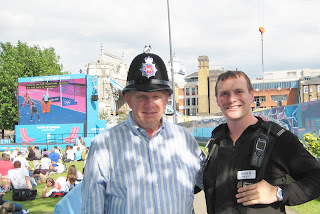With the news of Lance Armstrong's lifetime ban from the sport of cycling, the Olympics seems like months ago. I'm still unpacking though. And my merchandise collection is being assembled as you can see from the photo above. AND...they light up in the dark.
When I told that to my British friend, his response was "Why am I not surprised!?! A truly sophisticated piece of memorabilia. A thing of great beauty to amaze (or do I mean amuse) Seattle's social elite." Those Brits have such a way with words...and from a Cambridge grad at that.
During the Games, I talked to people in and around the event constantly. I watched the BBC coverage, which was everywhere, and read every newspaper I could find...and there is no shortage of ink in London. I kept a journal and notes on a pad in my pocket. It was from those scratchings that I wrote the blogs that many of you have read.
To put the subject to bed, I thought I would share a few of my notes that didn't make it into the "official" reports. Most are amusing and some just, shall I say, "British".
So here goes...
First of all, the Olympic Park was humungous. It covered 500 acres. The bullet train they put in would get you there in 7 minutes from Central London, but that was only the tip of the iceberg. On my first trip to the International Broadcast Centre (IBC), I found that it was on the opposite end of the park from the main tube station. It took me 45 minutes to walk there to see my friends at the Today Show. There was a better way to get there and I guarantee that Al Roker and Matt Lauer didn't walk that far.
The IBC would have made Boeing proud. It was built to accommodate over 20,000 journalists from around the world. It could hold five 747's wing to wing...making Everett a bit envious, I'm sure.

The main stadium held 80,000 for the Opening and Closing Ceremonies. There were only 25,000 permanent seats. A bone of local contention was the use of the stadium after the Games. The initial plan was for the West Ham United Football (Soccer) Club, the preferred bidder with the London Organizing Committee, to take it over. By the end of last year, the deal had fallen through and the stadium's long-term future is still unresolved. (The Bird's Nest in Beijing still doesn't have a bird living there.)
I mentioned that the big crises we were planning for happily did not occur, but there were plenty of very small fires to deal with:
The father of a French soccer player was threatened with expulsion from the stadium during a match with the USA because he waved a Brittany flag. Only national flags are permitted to be displayed during the Olympics.
A Korean couple was asked to leave the venue during a basketball game between the USA and Tunisia because their tickets were for a soccer match between Egypt and Belarus. They had the wrong tickets for the wrong event between the wrong teams at the wrong venue on the wrong day. That's just wrong.
Mayor Johnson gave us some inspired moments like when he was invited to start a Mexican Wave at the beach volleyball event but it failed when everyone raised their arms at the same time. Really? It's not that hard.
French national newspaper Le Monde had a headline that read, "You can never say it enough times. The Mayor of London, Boris Johnson, is a weird guy."
Only "official" food sponsors were allowed in the Park and at the IBC. Adventurous journos were able to find the preferred snack, Pringles, under the counter at the media centre's bar. That's journalistic resourcefulness.
British cricket commentator, Jonathon Agnew, had his umbrella seized by the Olympic "brand police" at the archery competition. He tweeted "Brolly confiscated because it has a golf name on it." They were judicious about enforcement.
Speaking of brands, the London Olympic logo was designed by Wolff Olins, a brand consultancy based in London. Cost...$600,000...just a little red, white and blue. Wow!

And finally on a very personal note, I am sorry to say that the song Chariot's of Fire will now forever remind me of Mr. Bean.
That's enough for now. It's been fun. ..onward and upward.
.jpg) For most of the year, we've been celebrating the 50th Anniversary of Seattle's Coming-Out party at the '62 World's Fair.
For most of the year, we've been celebrating the 50th Anniversary of Seattle's Coming-Out party at the '62 World's Fair..jpg) Sending someone into space for the Space Needle's 50th made international news. Who would have ever thought that we would be talking about giving a person like you and me a ride in rocket.
Sending someone into space for the Space Needle's 50th made international news. Who would have ever thought that we would be talking about giving a person like you and me a ride in rocket. Opening the most comprehensive collection of the works of famed artist Dale Chihuly was a great honor. It is a blazing presentation of color, form and substance. Such a jaw-dropping experience and success for all involved, especially the city of Seattle.
Opening the most comprehensive collection of the works of famed artist Dale Chihuly was a great honor. It is a blazing presentation of color, form and substance. Such a jaw-dropping experience and success for all involved, especially the city of Seattle.












.jpg)

































